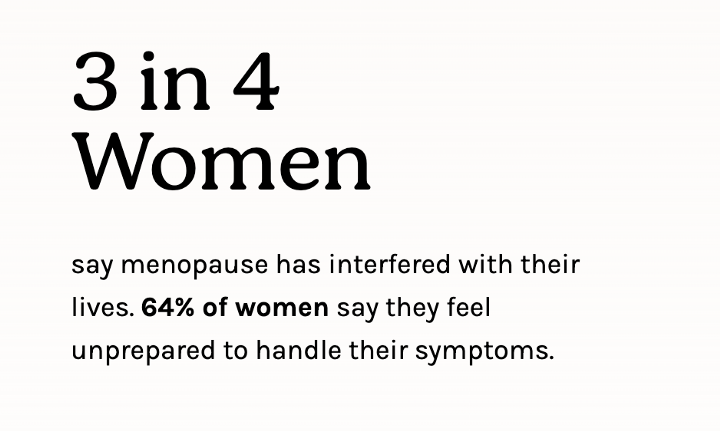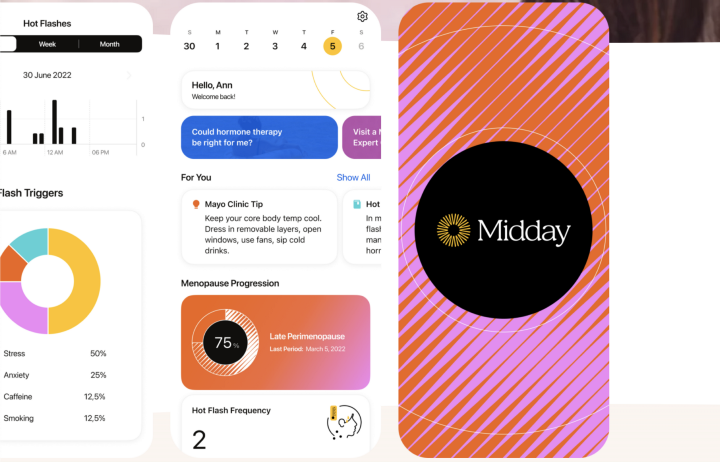
SRI spinout Lisa Health tackles the menopause gap with AI, digital therapeutics and a new app
Menopause has been so culturally stigmatized that, particularly in the past, mothers and daughters rarely discussed the physical and mental challenges that occur during and after the menopause transition. This stigma is also reflected in the disproportionate gap in the scientific literature dedicated to understanding the physiology of menopause and the management of its symptoms.
Advances in AI and wearable technology are rapidly advancing diagnostics, patient care and education across the healthcare industry. Recognizing the healthcare void for perimenopausal and menopausal women, a team of forward-thinking individuals from SRI International, SRI-spinout Lisa Health and the Mayo Clinic leveraged 21st-century technology, including AI, to create a cutting-edge end-to-end digital health platform for this historically underserved community.
Creating an education and treatment vacuum
The word “menopause” was only adopted around 1820, and the first full-scale longitudinal studies of the hormone fluctuations that occur during perimenopause — the time before menopause when the ovaries gradually stop working — didn’t happen until the 1980s. Research on menopause, symptoms and treatments continues to this day, but the proportion of research dollars allocated to menopause research is a tiny fraction of the amount dedicated to other aspects of female reproductive health such as fertility and pregnancy.
The deep complexity of menopause and the myriad of symptoms also means that no single medical specialty manages these patients. This has created a vacuum in both education and clinical care for perimenopausal and menopausal patients and their clinicians; in fact, fewer than 7% of medical residents feel they are adequately trained to treat women in this life transition, despite the fact that every woman will eventually become menopausal, and 85% will be symptomatic.

Courtesy: Midday/Lisa Health
With so little support about the timing of menopause and the management of its symptoms, many women turn to the internet and social media platforms for information, which is not ideal. While some sources provide reliable and helpful information to women, like the North American Menopause Society, other sources offer out-of-date or anecdotal information. Access to care and the lack of evidence-based and science-backed therapeutic options are also issues for many women. “The impacts of menopause on women and society are wide-ranging and we’ve ignored them for too long,” said Ann Garnier, co-founder and CEO of Lisa Health. A larger, more comprehensive solution was needed.
Developing a personalized solution for a unique journey
Lisa Health collaborated with SRI, Mayo Clinic and Radical Ventures to tackle the menopause gap head-on. “As a senior healthcare technology executive who was thriving in the workplace, I experienced firsthand just how debilitating menopause can be and the potential for it to derail my career and relationships. From that moment, I became passionate about using advanced technology to transform the menopause experience,” explained Garnier.
SRI researcher Massimiliano de Zambotti, Ph.D., an expert in menopause, sleep and wearable technologies, additionally serves as Chief Science Officer and co-founder of Lisa Health. “Ann and I combined our respective vision, competencies, data and innovation to produce several patent-pending breakthroughs in menopause management,” explained Dr. de Zambotti. He described their innovative work: “we are the first to develop novel AI algorithms for highly accurate detection and prediction of hot flashes and sleep disturbance. We’ve also done pioneering work in characterizing women transitioning through menopause across several domains of health, including stress, sleep and cardiovascular processes. The ability to identify these top biomarkers is paramount to offering precision therapeutics and symptom relief.”
They developed Midday, an iPhone app, to address the lack of deep tech, including AI and sensor technology, used by other apps designed to help women through this life transition. The app provides insights, education and a broad range of therapeutic support for women throughout their menopause journey and leverages several AI technologies to create a comprehensive and personalized approach to managing symptoms. The Midday app can pair with a commercial wearable device like Fitbit and uses AI and advanced algorithms to customize the strategies and insights provided to each woman depending on individual menopause progression, symptoms and other characteristics.

Midday also facilitates virtual care with menopause specialists and includes a tool developed by Mayo Clinic to help users decide whether hormone replacement therapy is right for them. Later this year, Midday will be able to use wearable technology to detect and measure hot flashes, understanding their pattern, offer insights on their triggers and provide different strategies for relief to the user. Garnier explained, “using simple commercial wearables, we can measure several biomarkers of menopause and wellbeing. That allows us to finally pinpoint and get to the root cause of a woman’s symptoms, deliver relief and measure and adapt to changes over time.
Changing attitudes towards Menopause
Garnier hopes that Midday is the first of many steps in changing society’s attitude toward menopause. “One of the things we don’t talk enough about is the perception of menopause,” she commented. “Fortunately, the historic shame and silence around it is starting to evaporate, which is wonderful. More women are feeling confident about talking about menopause amongst themselves and even more openly in the workplace or other venues. It’s important to dispel not just the shame and silence but also the negative perceptions around it.”
Ultimately, the Midday app may facilitate better health during what Ann sees as one of the most rewarding stages of life. “You get to tap into your accumulated wisdom, experience and confidence. And I think that in and of itself allows you to radiate a new level of confidence and empowerment compared to earlier stages of life. You just feel very comfortable in your own skin and with who you are.” She hopes that Midday will make it possible to “approach this life stage with joy and excitement about the possibility of what you can do now and in the future.”
Midday is available by subscription to iPhone users and can be downloaded through the App Store. Visit sri.com to learn more about SRI’s commitment to improving health outcomes at every stage of life.
Resources
Ford, T. (2022.) Lisa Health launches Midday, an app leveraging AI to personalize the menopause journey, in collaboration with Mayo Clinic. Mayo Clinic News Network.
Grose, J. (2021.) Why is perimenopause still such a mystery? The New York Times.



